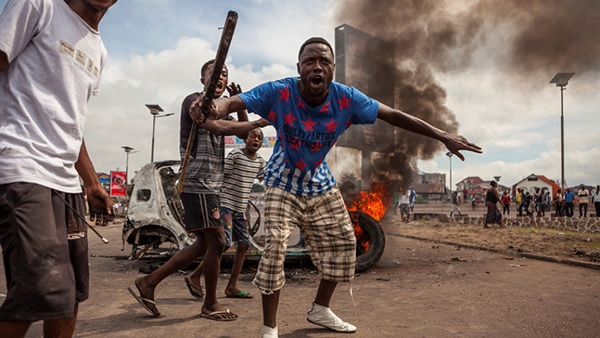
Kinshasa, DR Congo | AFP |
At least six people were feared dead on Monday in clashes ahead of a huge opposition rally in the Democratic Republic of Congo capital Kinshasa demanding that President Joseph Kabila step down.
Police fired tear gas to disperse hundreds of stone-throwing opposition supporters as they tried to march on parliament ahead of a planned mass demo to demand that Kabila quit power when his mandate runs out in December.
Government spokesman Lambert Mende told AFP that “two policemen were killed” in violence against the ruling party office in Kinshasa’s volatile Limete area.
A Catholic nun said one of the policemen had been “burnt alive”.
“We have now banned the demonstration,” Mende said, accusing the opposition of “targeted looting”.
“We have recorded several deaths,” said Bruno Tshibala, a spokesman for the opposition UDPS, adding that he had seen four bodies piled up in the office of an allied party.
Tshibala said “six million people” had descended on the streets but AFP journalists put the crowd at a few hundred.
Earlier Monday, youths shouting “Kabila get out” threw stones at police on an main avenue in the heart of the city of some 10 million.
Tyres burned and plumes of smoke rose from a burning car and minibus.
The demonstrators waved the blue-and-white flags of veteran Congolese opposition leader Etienne Tshisekedi, 83, whose UDPS movement had called for nationwide protests on Monday.
Kabila, who has ruled mineral-rich DR Congo since 2001, is banned under the constitution from running for a third term — but he has given no sign of intending to give up his job.
Before the clashes, opposition activists burned a giant poster of the president bearing a message appealing for the two sides to reach a solution to the political crisis through “dialogue”.
Youths were blocking traffic on Lumumba Boulevard, a main artery, letting only journalists through.
A diplomatic source reported further clashes in “several places” on the road to the capital’s airport.
Systematic repression’
France urged Congolese authorities to ensure that the “delay” in holding the next presidential election is “as short as possible”, and called on the government to respect “public liberties, especially the right to demonstrate peacefully”.
Kinshasa was eerily quiet on Monday. Schools were deserted in several districts, with parents preferring to keep their children home for safety, and many shops were closed.
The country’s second biggest city Lubumbashi was similarly tense, with soldiers and police out on force around public buildings and opposition neighbourhoods.
Protests erupted after the Constitutional Court ruled in May that Kabila, who took power after his father Laurent Kabila’s assassination, could remain in office in a caretaker capacity beyond his mandate.
No elections have been announced and it would be practically impossible to organise a poll before the end of the year.
Opposition leader Tshisekedi, who returned to DR Congo in July after a two-year absence, is an immensely popular figure who emerged as a leading dissenting voice as far back as the 1980s, when he was a critic of strongman Mobutu Sese Seko.
He has now accomplished the rare feat of uniting the Congolese opposition, which has never before managed to forge a common front against Kabila.
A fringe opposition group has been holding talks with the government in what authorities say is a bid to organise a schedule for delayed but “peaceful” elections, but Tshisekedi’s main opposition has refused to take part in the discussions.
The talks are supposed to wrap up Saturday, but the negotiators have yet to agree even on an agenda.
In June, another leading opposition figure, Moise Katumbi, was sentenced in absentia to three years in jail for property fraud.
The presiding judge in the case has since claimed she was pressured by the authorities into signing off on a guilty verdict, to ensure Katumbi would be ineligible to run for office, according to a letter seen by AFP.
The UN on Friday said at least 16 opposition activists had been detained in Kinshasa after meeting to discuss how to stop Kabila illegally prolonging his stay in power.
Rights group Amnesty International had on Thursday accused Congolese authorities of “systematic repression” of those seeking Kabila’s departure when his third term runs out on December 20.
 The Independent Uganda: You get the Truth we Pay the Price
The Independent Uganda: You get the Truth we Pay the Price



